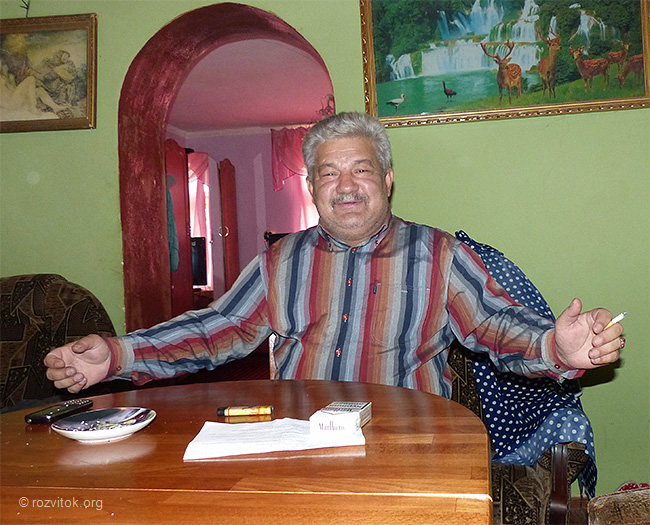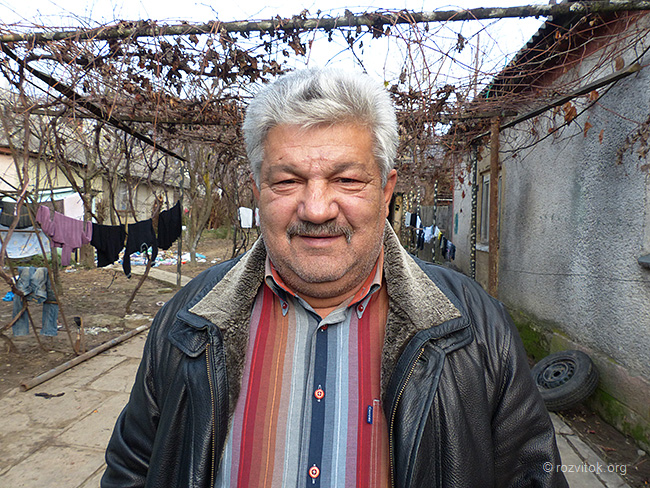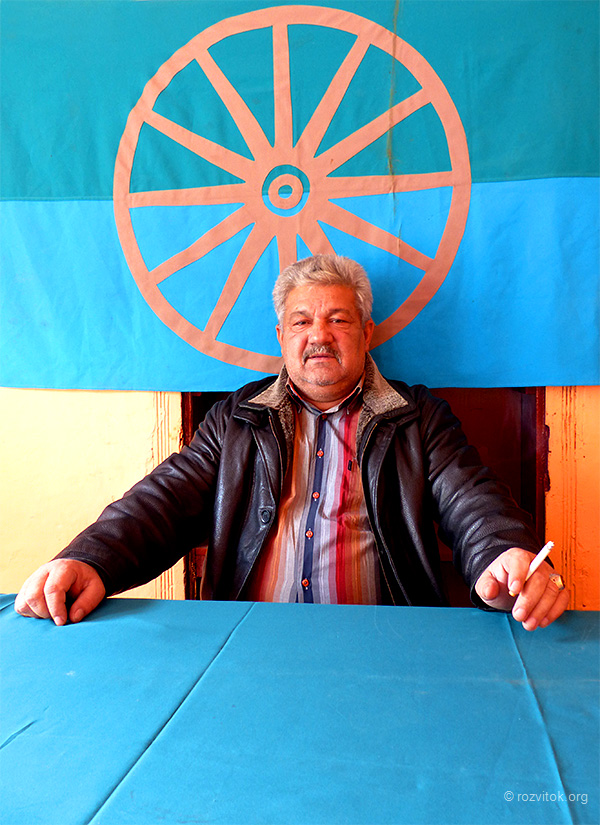Publications
Interview with the Leader of Svaliava

Today we want to introduce to you a very interesting person, Matvii Balint who is Roma deputy and the leader of the settlement, which is located in Svaliava, Transcarpathian region. This is the second pleasant meeting from the cycle “Interview with Roma barons in Transcarpathian region.” We are familiar with Matvii for not a long time, only four months from the time the lawyers of the “Mukachevo Human Rights Center” started to provide free legal aid in Svaliava, in the Roma camp. During this time we have established a very warm and close relationship, we can easily understand each other and are very grateful to Matvii for help and cooperation on providing legal aid to Roma in Svaliava.
So meet!
– Hello, Matvii! Please tell our readers about yourself and your career.
– Hello everyone. I am 55 years old and I was born in Svaliava Transcarpathian region, where I live now with my family. In 1984 I entered the Saratov Agricultural College, successfully graduated, and got a specialty as a machine operator. During military service I studied in construction school and received the right to operate cranes. 5 years as a machine operator, then as a crane operator.
– How many children are there in your family?
– I and my wife raised seven children. They received full secondary education. They are all married, and have their own homes. Today we already have 26 grandchildren.
– When were you first elected as the mayor?
– In 1991 I was elected as the elder of the Roma settlement in Svaliava, so I have managed the camp for 23 years. In addition, since the second convocation, I am usually chosen as a deputy of the Svaliava city council. Judging from the election results, people trust me and this is the most important for my work. In the last election I got 98% of votes – from two thousand people, only 13 voted against me. The elections in the Roma settlement, for your information, are conducted according to all laws – with ballot papers, booths for secret voting, and other important things. At the elections was the mayor of the deputies, the heads of administration, officials, and the representatives of the law enforcement agencies. I can assure you that Roma are ensured the free expression of their will concerning their leader, elder or baron.
– Matvii, have ever been any times when you have to be both: on the side of the law, and on the side of the Roma traditions?
– I, as the mayor and deputy elected by my people to defend their rights, so I must be on the side of my people. I have been through many deputy convocations, and know how the Roma people live, and how to find a compromise with officials. For 22 years in the camp, only 3 persons were sentenced and imprisoned for 4-5 years. But they repeatedly violated the public order, so it was a forced measure of so-called educational process. Despite the tradition, I believe that the law is the same for all.

– Is the problem of employment important for your Roma settlement?
– The problem of employment in our settlement is on the same level as elsewhere in Transcarpathian region. Only 2.5% of the working people work officially. Those are engaged in sanitary cleaning of the city, they are employees of municipal services.
– Why do you think Roma cannot find a job?
– A job can be found, but mostly it is seasonal. In Svaliava, unfortunately, large state enterprises and factories were closed. Today, most entrepreneurs hire their relatives or friends. So, there are a little works for Roma in Svaliava. We have forgotten of marketers. They are registered as private entrepreneurs, live more or less decently. But the number of them is not so large.
In general, the situation with the work can be called critical. Regarding formal employment obstacles is the lack of documents and illiteracy. This often concerns even unskilled work – porters, cleaners, handymen, etc. Almost all Roma, trying to find work in the city confirm that the failure to provide jobs is primarily connected with their ethnicity.
– What can you say about education of Roma in your settlement?
– If we will take the average, almost 50% of the people in the camp are educated. Although, all the older generation have lower secondary education. Now rates have fallen, due to poverty and unemployment. Currently, only 280 children attend school. Many children cannot go to school because their parents take them with them for seasonal work, because the whole family has to be together.
If we analyze the situation, I can say: now those Roma can survive who are a little better educated. Obviously, educated person thinks differently, so they live their lives differently.
– Is there a difference in the life of Roma in the USSR and now?
– Yes, of course. Let’s go back to the beginning of the interview – I studied and worked as a machine operator, tower crane driver. I received two degrees. I had to work, because if I did not work for 10 days, I could be condemned. Roma then also left for seasonal work, but officially; we had certificates of employment. Work-book was to be conducted continuously. The living standards of Roma were much higher.
– Are Roma believers?
– Yes, all Roma were Christians. In recent years, Protestants have appeared in our camp, and about 10% of the settlement went to them.
– Matvii, do you think that there is a difference between Roma in Svaliava and other Roma in Transcarpathian region?
– I can say one thing – Roma of Mukachevo and Svaliava are similar in mentality. But if you take Perechyn, Vynohradiv, Berehove districts – the Roma have a different mentality there. As for the language, for example – in Svaliava 80% speak Ukrainian, the rest – Hungarian. In Mukachevo, for example – 100% speak Hungarian, so we have the higher level of integration (smiling) despite the fact that our camp is three times smaller than the camp in Mukachevo.
– How strong is tradition in the camp?
– I can assure you that there are not so much Roma traditions left in the camp. Our culture, unfortunately, disappears virtually. The chairmen of the NGOs have repeatedly submitted projects for funding to support the Roma’s cultural characteristic crafts. We would like to teach young people the traditions, but it is very difficult without money. The music, however, is in the blood of Roma, it is somehow transmitted. But, for example, blacksmithing disappears virtually. Young people are, unfortunately, not even interested in this. If there was an opportunity to open some sections, I think, things would have changed.
– It is interesting to know whether someone can be driven out of the camp due to misbehaving in the Roma community.
– Such cases are rare. If the family is behaving bad in the camp, disturbing the others, has problems with the law, the elders can take appropriate actions. For this purpose the higher body of our government is gathering – the meeting of the elders. They have the right to condemn and expel the dishonourable family from the settlement.
– How do you call yourself in Svaliava – Roma or Gypsies?
– We are Roma!
– Do the camp residents face discrimination in governmental or law enforcement agencies?
– If the Roma themselves fall into a situation where they have to communicate with government officials, they often endure hostile attitude. This is especially true about brutality and abuse by police officers. In the state bodies may be unmotivated refusals, unwillingness to understand the situation. This problem is especially noticeable when Roma are trying to get social assistance or benefits and constantly need to update a lot of documents for that.
In response Roma do not complain; that shows their low legal culture: ignorance of the law and their rights, not knowing where is necessary to address a complaint, the inability to properly formalize the complaint, disbelief in the possibility to defend their rights, distrust to officials and uncertainties if they could prove their innocence. At this point I have to get involved. But anyway, discrimination against Roma in Transcarpathian region will always be, because, according to the NGO’s statistic there are at least 70,000 of us. Not even centuries will pass until we will be accepted as equals.

– What do you think, where did the stereotype arise that Roma are thieves, beggars, etc.?
– This problem exists. If you take ten Roma families, two of them live very poorly. Because of it they often drink and live in uncomfortable conditions. A drunken person can go and steal something or disrupt public order. Although I am leading a normal, law-abiding life, I am known by many and I am respected in the city. But still sometimes I can hear of people dismissive: “look, gypsy goes.”
I would call this phenomenon antiziganism. And it has very deep roots. In brief about it – Roma always led a nomadic life, and few people could grasp in our culture, customs, traditions, and so on. For this at least had to roam with us. And all the unknown causes some watchfulness, caution and fear.
– How many mixed marriages are there in the Roma settlement?
– Yes, there are marriages like that: mostly Roma women bring men from outside to the camp. Although, there are also some men who bring women. Mainly these are normal, good families. The camp takes strangers friendly (smiling).
– How does the standard, classical, Romani family looks like?
– On average – four children. Of course, there can be more: less – no. For Roma it is important to have many children. Not because they receive social benefits for them: but because parents in old age need to have somebody who will look after them. Besides, for Roma is very important the cult of mothers. A young woman is not considered as a developed personality until she gives birth to a child. To have a child for Roma women is to have status in the family and in the camp. It is like when a “white” person gets any professional achievements and career (smiling). The status of mother is surrounded by honor. There is a trend: the more successful Roma woman is as a mother the more significant her opinion and position in the camp is.
For Roma, children are one of the most important values, and its pity that people identify this phenomenon with big money. In Roma families the children are allowed everything. Often because of it we see how they run dirty from dust. They love freedom since childhood. The more children in the family, the calmer parents feel. Although Roma kids since childhood are used to be alone with the outside world, the child’s parents are ready to do anything for the sake of their child.
– What would you identify as the main problems of the Roma in Svaliava?
– A serious problem for our Roma is the process of obtaining documents, including passports. Thus, after the birth of a Roma child, parents are usually in no hurry to issue a birth certificate, and young Roma of 16 years of age tend to put off getting a passport. To prevent this are both: material costs and the need to gather all papers that are not so easy to get for Roma. The lack of documents is sometimes a source of conflict in relations between the Roma and the authorities.
Other issues – roads, drinking water – are more or less solved. The road is repaired every year. Already, we made new road project on one street – asphalt and sidewalks. Unfortunately, although, the project was ready a year ago, this year the budget money was not enough.
On the other hand, the extremely poor conditions of living, monotonous food and drinking water cause high morbidity among Roma. This is especially true of tuberculosis and gastrointestinal infections that are spread not only among adults but also among children. To get proper treatment is very difficult and expensive.
You have already seen the public utilities condition, during our walk through the camp. But working outside on Saturday, unfortunately, is not realistic for us. Because 70% of Roma are surviving and live only for today. If someone goes to work outside on Saturday, it means he will not go to work and family will not have what to eat.
– Does the government meet you halfway?
– Yes. I would not be so many years as the deputy if I could not establish normal relationship with the authorities.
– And before you became a deputy what were the problems in the camp?
– The biggest problem was and is the registration of the real estate – land and households. It is known that Roma are nomads and for them the very concept of the real estate has always been strange. Roma 25 years ago did not even imagine what belongs to them according to the law and what – not. At the same time we also have the same rights, but we did not use them out of ignorance. How to appeal, ask for help – now, thank God, elders have understood that and work together. As anyone knows – we help one another. I think in the future it will be even better.
– What are your achievements as Baron and deputy over the years, you are mostly proud of?
– During the first year of my chairmanship, I found work for 300 residents of the camp. I went abroad, signed contracts, and managed to negotiate the autumn work for 4-5 months. Per day Roma could earn 200-300 grivna. I built the first road in the camp, and then did the overhaul of roads. Drinking water was only in the pits. I did plumbing in every home. I made the allocation of land for 40 young families. They have built houses there and we now have a new street in the camp, home to young couples only – Youth Street. I have developed a strategy for the development of the camp, I have big plans. I hope that I will find sponsors for these projects. But I can say that I am happy with what we have now. For it I have full understanding and support from both: the city council, district administration and the residents of the camp.
– Can you say that the camp is developing, and the population increases?
– Yes. Each year the camp is increasing. We try to help new families to receive land, housing, help them to execute documents.
– And the last question Matvii, do you think it is necessary to integrate the Roma into society?
– Of course! But it should be understood that such integration for Roma – it is a restriction of freedom. At least they think so because the Roma were always free from the birth, free to go and stay wherever they wanted; and integration means a sedentary life, responsibilities. And what may be the responsibilities of a free man (smiling). Some Roma properly understand it. For example children must go to school, but if you want to go to another city to work, parents cannot give the child in every city in the new school. Therefore, some parents do not send their kids to school; we have such families in the camp. But it is bad, children have to go to school. They have a better life than we have. But how to change live without education? In no way.
Matvii, thank you for the interesting conversation.
Read also the interview with the elder of the Roma settlement in Mukachevo – Alexander Balog.
